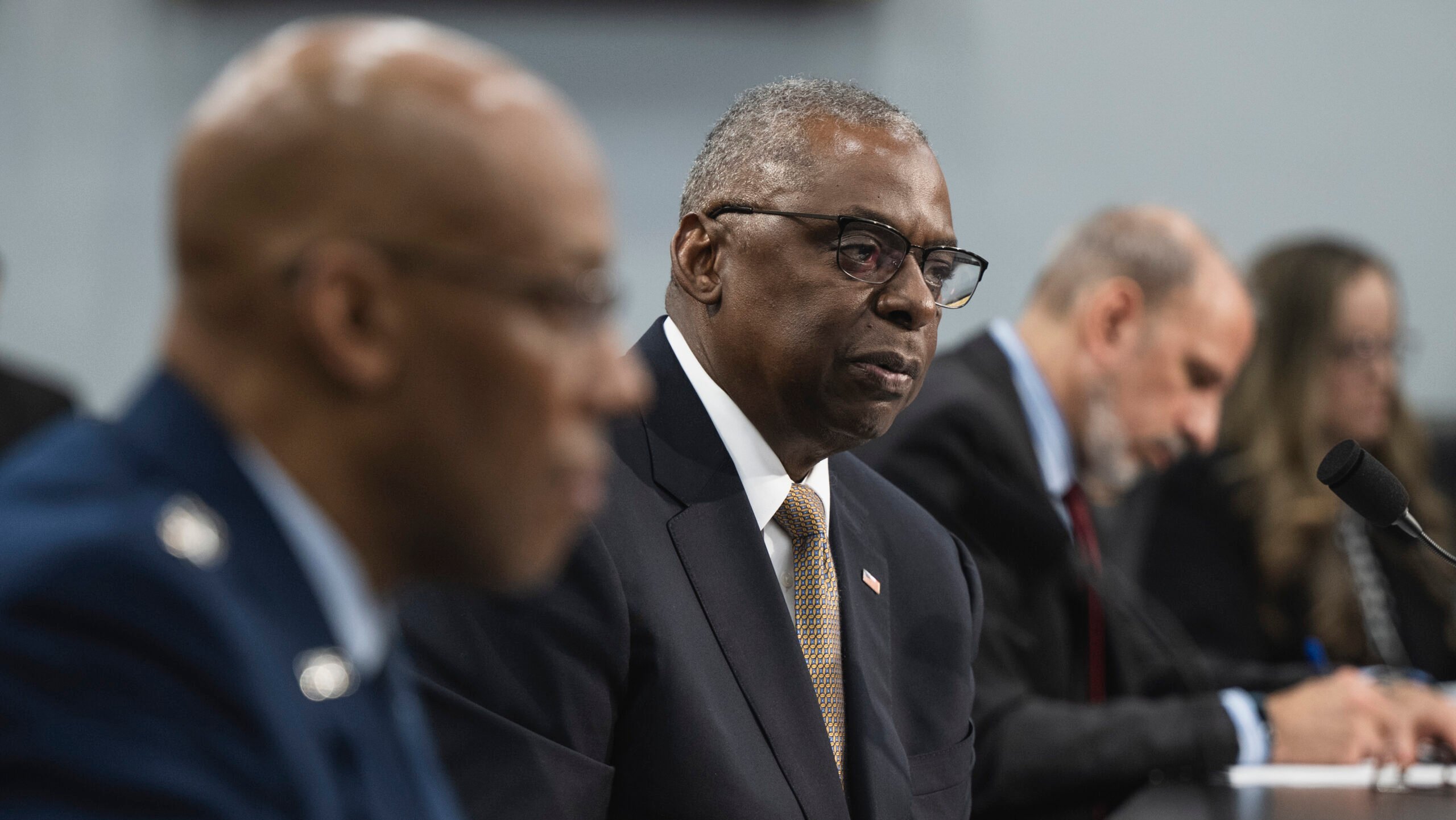
Secretary of Defense Lloyd J. Austin III, Air Force Gen. Charles Q. Brown Jr., chairman, Joint Chiefs of Staff; and Under Secretary of Defense (Comptroller)/Chief Financial Officer Michael J. McCord provide testimony at a House Appropriations Subcommittee on Defense hearing on the Department of Defense fiscal 2025 budget request, Rayburn House Office Building, Washington, D.C. March 17, 2024. (DoD photo by Chad J. McNeeley)
WASHINGTON — With House lawmakers poised to consider a series of supplemental spending bills this weekend, Pentagon Comptroller Mike McCord disclosed today that the department is already $2 billion in the hole for unfunded operations in Europe and the Middle East this year.
And if Congress is unable to act, the department will have to look to cut into “enabler” funds — likely facilities and weapons accounts — in order to make sure forces can remain deployed and supporting operations.
“We have incurred over $2 billion, and counting, of operational costs that if we can’t get the supplemental, will have to be absorbed in the base budget,” he said. If that happens, the goal is to protect the military forces’ ability to train and be ready for combat operations, while “readiness enabling” funds will take the hit.
Make no mistake, he added, “there is an impact on our forces and our readiness as well, if we cannot get the supplemental approved.”
The challenge of unexpected operational costs is becoming a theme during budget hearing season. Since the Oct. 1 start of the fiscal year, the Army has spent about $800 million in unplanned operations costs in Europe and the Middle with service leaders warning they may have to cut training and exercises around the globe. Air Force Gen. Jacqueline Van Ovost, the commander of US Transportation Command, told lawmakers last week that her command has already fronted $172 million in transportation costs supporting operations related to Israel but project that to grow to $550 million this year. And earlier this week, Navy Secretary Carlos Del Toro said his service has incurred $1 billion in unplanned munition costs just from operations in the Red Sea in the last six months.
A Supplemental Vote At Last?
McCord — alongside Defense Secretary Lloyd Austin and Chairman of the Joint Chiefs of Staff Gen. CQ Brown — appeared before the House committee to field questions about the department’s $849.8 billion FY25 discretionary spending request.
But it was House Speaker Mike Johnson’s evolving supplemental plan that stole the limelight on Capitol Hill today, with the House Rules Committee releasing separate funding bills for Ukraine, Israel and Taiwan totaling $95.3 billion shortly after the hearing ended.
Although the Senate passed a $95 billion supplemental spending bill in February, the measure has languished in the House due to opposition from a segment of hardline Republicans, who oppose further spending for Ukraine.
With pressure mounting to increase aid to Israel after Iran’s attack this weekend, Johnson, R-La., sought to deliver a solution that would appease the ultra-conservative members of his party, essentially splitting the Senate supplemental spending bill into three buckets — a move that allows funding for each country to either be approved or die separately.
The measure includes:
- The $60.8 billion Ukraine supplemental includes about $48 billion to replenish US weapons stockpiles, fund US operations in Europe and to provide defense technology to Ukraine through the Ukraine Security Assistance Initiative.
- The $26.4 billion supplemental for Israel and Middle East operations includes $4 billion for Iron Dome and David’s Sling, $1.2 billion for Iron Beam, $3.5 billion in Foreign Military Financing for Israel and $4.4 billion to replenish US stocks.
- The $8.1 billion Indo-Pacific Security Supplemental includes $3.3 billion for the submarine industrial base, $2 billion for support to Taiwan and $1.9 billion to replenish stocks given to Taiwan. Funds for the submarine industrial base would $1.9 billion for advanced procurement of the Columbia-class submarine and $200 million in advance procurement for the Virginia-class submarine.
The House bills are a departure from the Biden administration’s six-month old $105 billion supplemental spending request that lumped military aid for Ukraine, Israel and Taiwan together [PDF]. And while the House bills roughly match the Senate supplemental, with the largest change involving language that calls for a plan for Ukraine to pay back certain loans, the Senate may need to start over and pass the individual House bills.
The endorsement of President Joe Biden, who said this afternoon that he strongly supported the House spending package, could pave the way for approval of the House bills in the Democrat-controlled Senate.
“The House must pass the package this week and the Senate should quickly follow. I will sign this into law immediately to send a message to the world: We stand with our friends, and we won’t let Iran or Russia succeed,” Biden said in a statement.
Byron Callan, an analyst with Capital Alpha Partners, said the House bills are a “positive for US defense sentiment,” with a total value equal to the Senate supplemental and a high likelihood of being enacted into law.”
“There will be GOP opposition to some of the bills, but we expect enough GOP support along with Democrats for these to pass,” he said in a note to investors.
As Ukrainian forces encounter ever-increasing materiel shortages, Ukraine needs additional resources as soon as possible, Austin and Brown told lawmakers.
“Ukraine, right now, is facing some dire battlefield conditions and it’s partly because they’re pulling teeth from a resourcing standpoint — whether it’s munitions, whether it’s vehicles, whether it’s platforms. They’re not being outmatched by the Russians,” Brown told lawmakers. Without continued international support, including from Washington, the four-star Air Force general warned that Ukrainian forces will continue ceding ground to Russian forces.
Beyond the supplemental’s direct implications for the war in Ukraine and on Moscow, the measure could stem growing concerns internationally, Austin noted.
“Delaying the supplemental sends a terrible signal to our allies and partners, and they will question whether or not, you know, we are committed,” Austin told House lawmakers.
UPDATED 4/18/2024 at 9:41am ET to correct dollar figures related to the submarine industrial base.






















